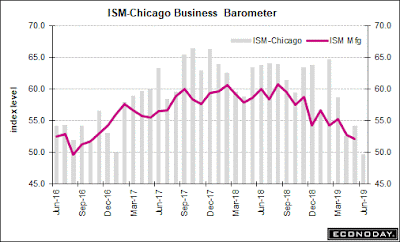Popular Economics Weekly
Trade wars are not really winnable anymore—at least the way some world leaders conduct them—or any wars for that matter. This is because we no longer live in a win-lose world where the strong are able to so easily prey on or even conquer the weak and vulnerable.
The world has become too populous, and thanks to modern technologies too interlinked for modern economic bullies—like a Trump, or Russia’s Putin, or even China’s Xi Jinping—to succeed for long in their win-lose negotiating tactics based on perceived grievances.
And that is the reason Trump’s trade wars are failing. NAFTA is still NAFTA, because the U.S. depends so heavily on trade with Canada and Mexico. And now there are predictions that his China trade war will fail as well, because his policies are causing so many losses among his Midwest electorate, and now the US manufacturing sector.
Why are we even having trade wars with our allies, as well as adversaries?
We can thank UC Irvine economic professor Peter Navarro, a protectionist, anti-free trade advocate, for convincing President Trump that multi-lateral trade agreements that link us more tightly to our allies are bad for the U.S., including the 12-nation TPP, Trans-Pacific Trade Partnership, that was designed to curb China’s economic expansionism.
So Trump cancelled the TPP and began his trade wars with our allies in Europe, as well as Canada and Mexico, where the U.S. does most of its trade. The result has been slower growth everywhere, as has been cited in many studies.
“Trade growth, a key artery in the global economy, has also slowed markedly, to around 4 percent in 2018 from 5¼ per cent in 2017, said a recent OECD economic outlook report, “with trade restrictions having adverse effects on confidence and investment plans around the world. In Europe, trade growth has stalled, reflecting a slowdown in both external and internal demand. Leading indicators suggest that near-term trade prospects are weak. Survey indicators of new export orders remain low in China and continue to decline in Europe and many Asian economies.”
The U.S. has the Chicago ISM Business Barometer of business activity to measure such activity, a survey of more than 80 economic indicators that show a general national trend. It is giving similar results to the OECD outlook; slowing US growth as well.
The MNI Chicago Business Barometer decreased by 4.5 points to 49.7 in June from 54.2 in May, marking the first sub-50 reading since January 2017, said their press release. Business confidence dipped significantly in Q2, with the Barometer averaging 52.2, down 13 percent on the previous quarter and almost 16 percent lower than Q2 2018.
This month’s special question asked firms about the impact of government-imposed tariffs on their business. 80 percent of firms said that they were negatively impacted, with tariffs raising prices of their goods leading to a pullback in orders.
The June ISM manufacturing Index also fell to 51.7, the slowest pace in more than two years, hurt by trade tensions with China and Mexico. “Backlog orders continue to contract, inventories are coming down, delivery times are improving, import buying is flat -- all signs of weakness. Another disappointment is a 0.5 point decline in new export orders which are barely growing at 50.5,” said the report.
The LA Times has reported on other damage caused by the trade wars; the sharp decline in Chinese direct investments in US manufacturing that had been growing until last year’s start of the Chinese trade war. Investments shrank to $5 billion in 2018, after $29 billion in plant and equipment in 2017 and $46 billion in 2016, which had been responsible for thousands of new, higher-paying American jobs.
Such win-lose trade tactics are designed to fail, as skilled negotiators have been saying since the end of WWII, when allies and alliances have been necessary to keep the world peace (e.g., the Marshall Plan).
“…win-win negotiation involves working to get the best deal possible for yourself while also working to ensure that your counterpart is satisfied (see also, Win-Win Negotiations: How to Manage Your Counterpart’s Satisfaction), says an article in the Harvard Law School blog. “It means making offers that are good for them and great for you, according to Massachusetts Institute of Technology professor Lawrence Susskind. And it means thinking creatively about how you can get more of what you want by helping the other side get what she wants.”An Eye-for-an-Eye Makes the Whole World Blind was Mahatma Gandhi's famous insight, patron saint of non-violence.
Most of the western world has progressed beyond that stage, at least, in this world of super abundance. We no longer suffer from starvation or famine in the developed world. Only by helping those underdeveloped countries still suffering from overpopulation and droughts to enter the modern world will we be able to replace the belief in cut-throat competition of the win-lose crowd that sees conflict as the only solution, with the win-win world of cooperation, and a lasting world peace.
Harlan Green © 2019
Follow Harlan Green on Twitter: https://twitter.com/HarlanGreen


No comments:
Post a Comment